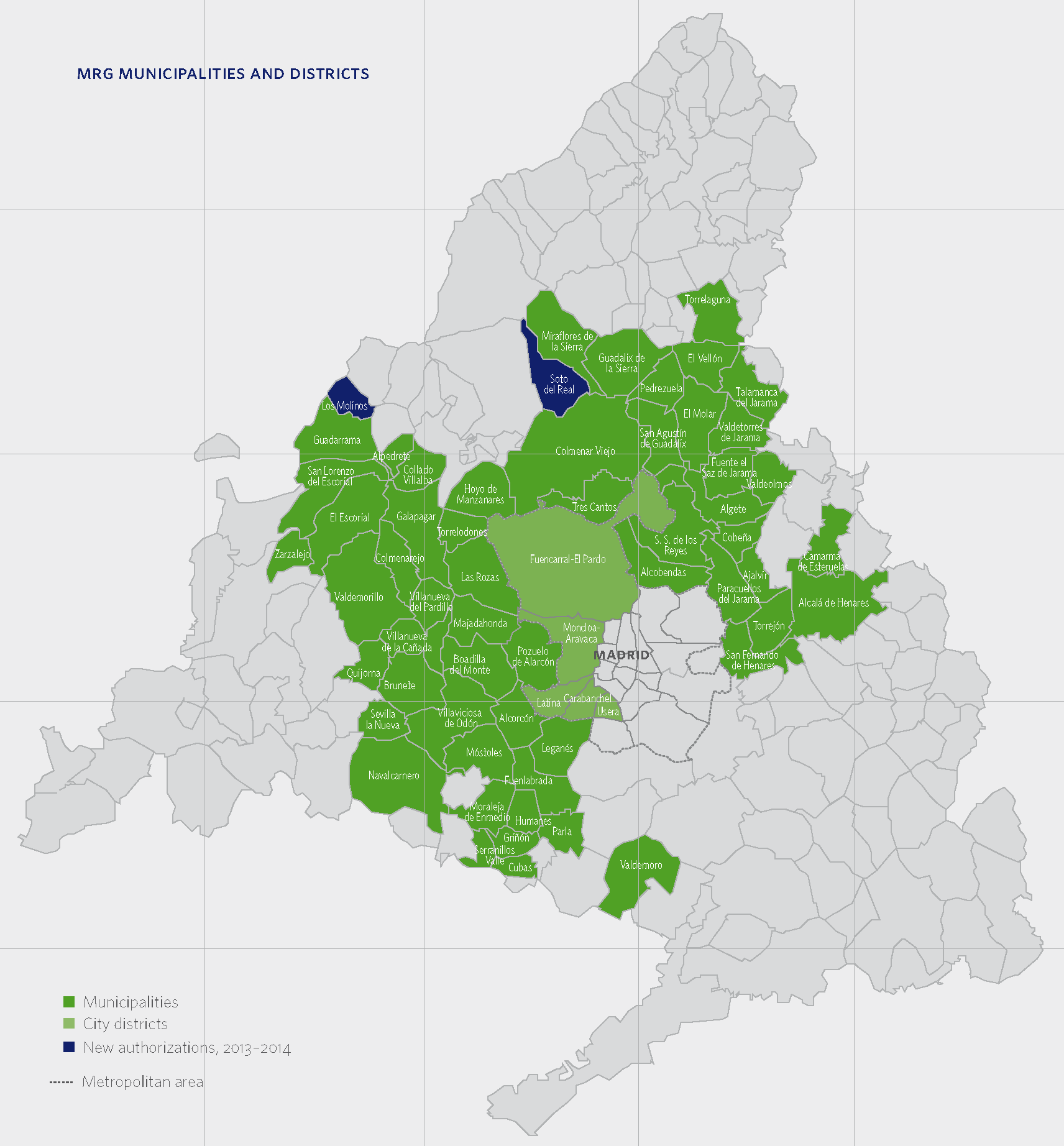
Efficient operation and productivity
With the goal of providing end users with outstanding service, we have put in place the necessary quality metrics for meter readings, periodic inspections, contract terminations, reconnections , complaints and emergencies. All these activities undergo continuous development and improvement in order to optimize consumer satisfaction.
Madrid: Full Marks
The gasification of the trade fair facilities within Madrid’s Casa de Campo woodland reserve was a long-standing project which was finally completed this year.
The starting point was the implementation of gas supply to the PIPA pavilion and to the planned “Safety City.” This led to a project for gasification of this area of the Casa de Campo reserve, driven by Madrileña Red de Gas in partnership with various entities. The construction of more than 2000 m of pipework will make natural gas available to 18 miscellaneous buildings: eight restaurants, a high school, municipal swimming pools, a SAMUR emergency response base, and various public facilities. The switch to natural gas will bring significant savings (these buildings consume over 7 GWh per annum) and a decrease in carbon emissions of over 600 metric tons per annum.
Insourcing of key activities
Industry regulations require that at two-year intervals a thorough review be conducted throughout the entire distribution network to detect any gas leaks. In the course of this process MRG uses special equipment to detect methane emissions above the paved surface covering the natural gas pipework. Any detected gas emission is classified by severity: urgent action required (level 1), periodic action required (level 2) and monitoring required (level 3). This classification reflects the following factors: operating pressure, concentration, and proximity to buildings or other pipelines.
Leaks calling for urgent action are addressed immediately by our emergency team, while level 2 and level 3 incidents are dealt with on a periodic basis by the network maintenance team. We later conduct a review in the course of which the results are compared to earlier events so as to resolve incidents and make any required improvements to the network.
In support of this process Madrileña employs 31 specialist technicians who are able to respond 24 hours a day, 365 days a year, through both emergency action and periodic preventive maintenance. Periodic maintenance has now been brought entirely in-house, thus enhancing efficiency and optimizing the working time available to emergency technicians.
100 % of service supervision is performed by our emergency technicians, thus optimizing travel distances. Leak reclassification is also conducted entirely through our own staff, raising quality and safety.
Emergency response
We highlight that MRG has achieved excellent response times to emergency alerts. Madrileña is now an industry leader in this metric, thanks to its day-to-day efforts to shorten the time within which it addresses potential risk situations at consumers’ premises and/or within the natural gas distribution system.
MRG’s average emergency response time is well under the statutory limit. While the statutory response time for a level 1 alert is one hour, Madrileña’s average stands at 30 minutes. For level 2 alerts, service is provided within 60 minutes on average, as compared to the statutory two hours.
We achieved our target to ensure that level 1 response times exceeding the hour limit is under 4% of all alerts annually – during the period, level 1 alerts dealt with in less than one hour came to 99.4% of the total.
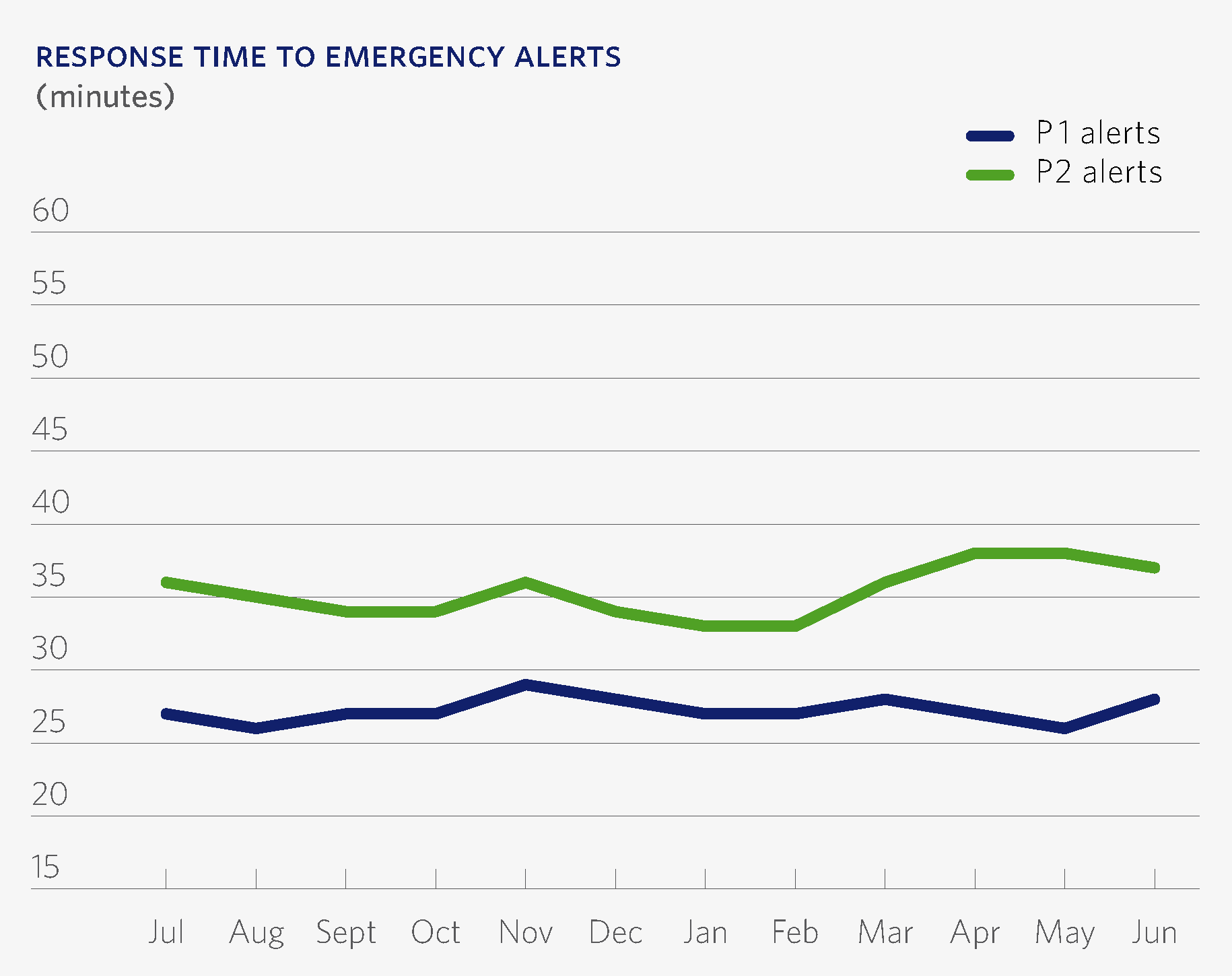
Network maintenance
Madrileña’s maintenance plan specifies all the preventive maintenance actions to be taken on all assets within the distribution system in terms of scope, frequency, and other features. The plan is monitored using an SAP-PM module which optimizes maintenance management.
Madrileña employs 10 technicians for network operation activities, including maintenance of metering and pressure regulating stations (MPRSs): we have brought all preventive maintenance and 80% of corrective maintenance in-house. By optimizing its maintenance plan, Madrileña has significantly raised the quality and reliability of MPRS functionality.
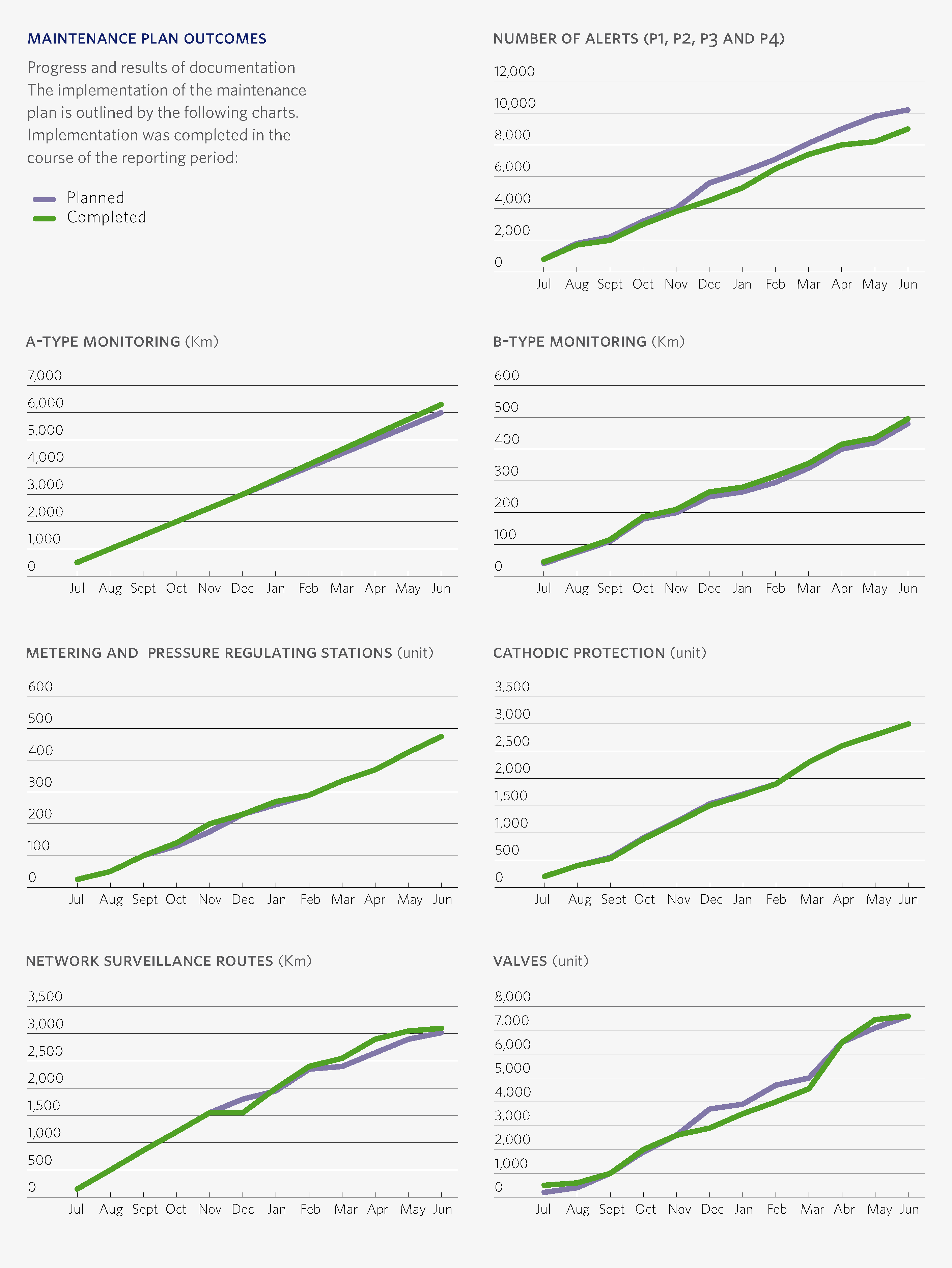
We also conduct cathodic protection maintenance largely in-house – 90% of corrective maintenance and 20% of preventive. This enables MRG specialists to perform directly in the field instead of merely overseeing contractors’ work. This step further safeguards the quality of MRG’s operations.
Cooperation with supply companies
Madrileña Red de Gas has displayed the ability to react and adapt effectively to the needs of supply companies in its territory. This has translated into a 400% increase in operational responses in payment default shutoff campaigns launched by suppliers for debt recovery purposes. MRG is an industry leader in creating proprietary methods, which have raised fieldwork success by 60%. Highlights include our vertical working (climbing) techniques because at least half of households have no accessible meter. These new methods, among others, raised operational costs by 100%, but the effort considerably increased the number of reconnections within the regulatory time frame of 48 hours.
The development of natural gas vehicle adoption in Madrid
At present, MRG has commissioned a service station for the waste collection truck fleet operated by the Boadilla del Monte municipal authority, and a new public service station at Alcorcón. In the coming months, a new public service station is scheduled to open at Aravaca, and several municipal authorities – including Madrid – are expected to put out tenders for the construction of new public refueling sites. The groundwork has been laid for the introduction of NGV buses operated by new intercity transport companies.
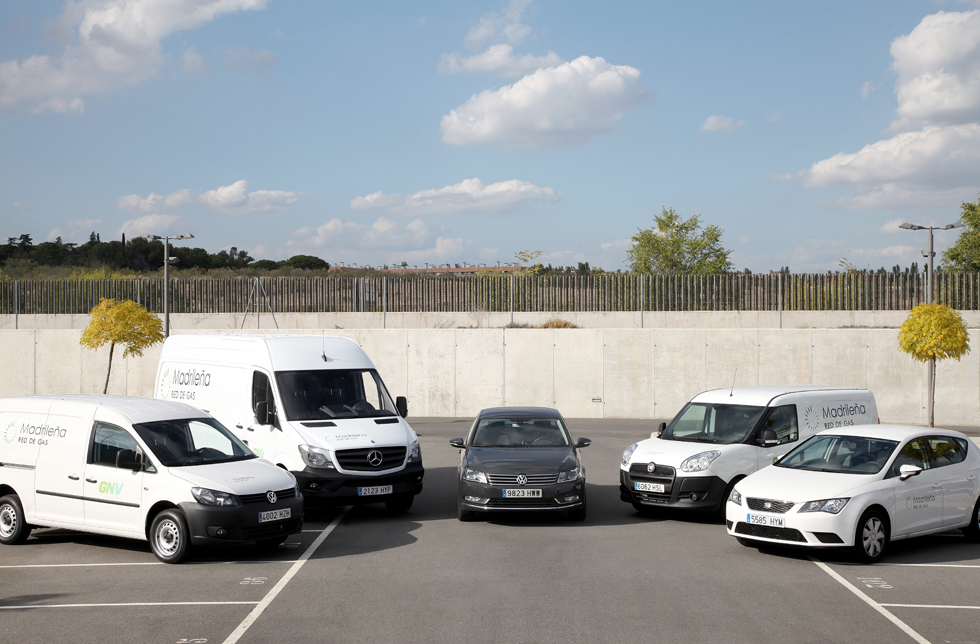
Updating our vehicle fleet
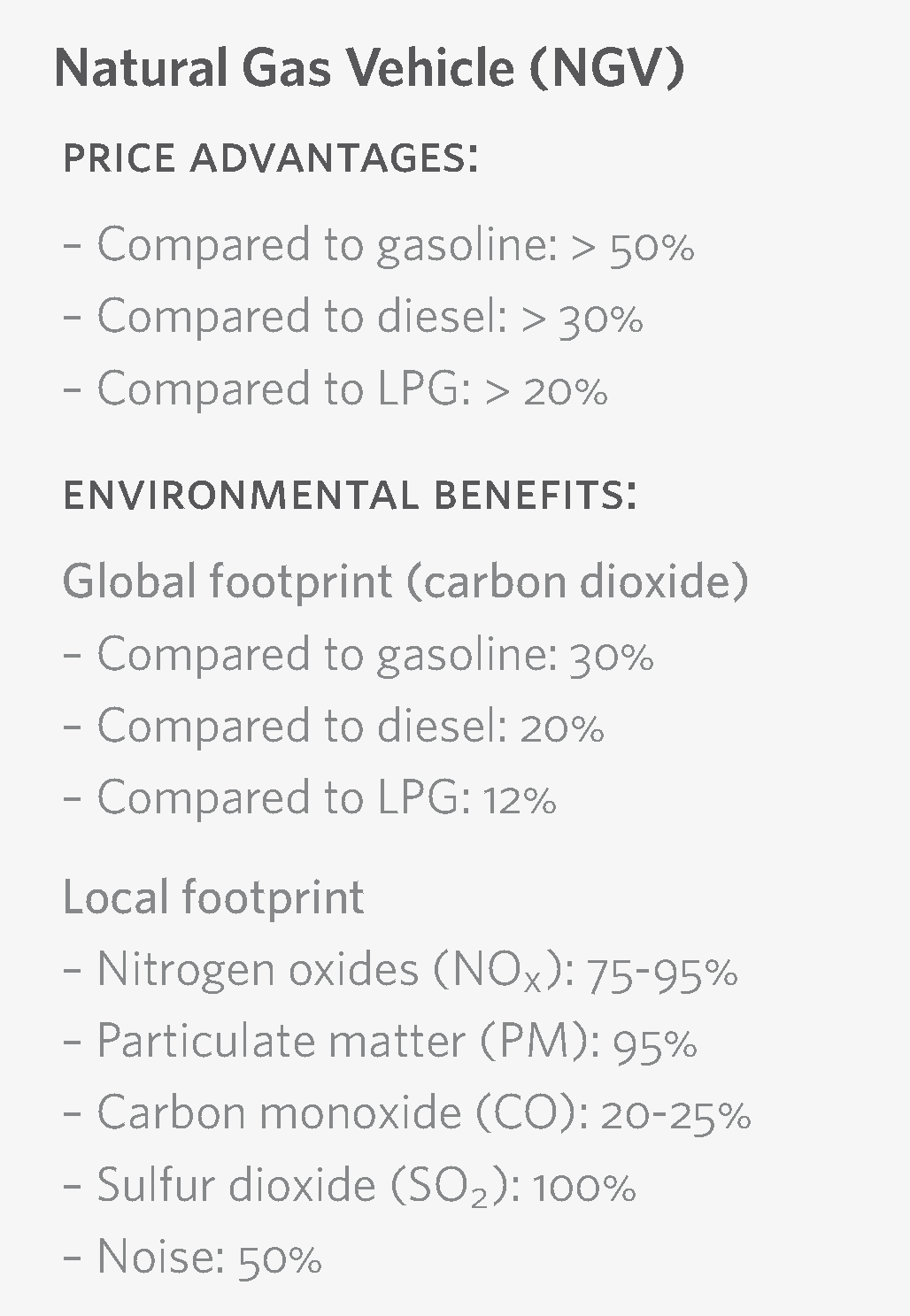
As part of our natural gas development policy, Madrileña Red de Gas is a front runner in promoting the use of NGVs. The use of natural gas for transportation purposes brings both environmental benefits and economic savings as compared to other fuels. Natural gas-fired engines are cheaper to maintain and have a longer useful life than engines powered by liquid fuels.
MRG will replace its entire fleet – about 60 vehicles – with Natural Gas Vehicles (NGVs). We have acquired new Fiat Dobló vans to equip our network operation units, and four Seat and Volkswagen cars for technical and sales managers. We are in the process of acquiring more Seat units and Volkswagen Caddy vans for network operation management officers.
Driving the development of natural gas
Although the gas industry is regulated, the development of natural gas is one of the key factors of Madrileña Red de Gas’ mission. We are committed to publicizing its benefits and raising awareness of its suitability as a replacement for costlier and more pollutant fossil fuels. The shift toward natural gas produces savings in the country’s energy bill, lowering energy costs for end consumers and cutting down atmospheric emissions with no additional cost to public funds or private resources.
MRG is accordingly promoting and taking part in efforts to implement new NGV service stations. A number of trends strongly suggest that the present transportation model is unsustainable over the medium term. Almost 100% of energy sources are petroleum byproducts: world reserves are limited, and are concentrated in geo-politically problematic regions. Fuel prices are both volatile and follow a historically upward path. Given the economic and environmental advantages, the rise of NGVs in Spain’s mobility system offers an attractive opportunity for consumers and opens up new product perspectives for the domestic automobile industry.
Engaging in new regulation
In recently developed domains that have not yet been covered by specific regulations – such as NGVs – Madrileña Red de Gas has supported policy-making by providing comparative studies of relevant legislation across Europe. Highlights of this process include parking natural gas vehicles in spaces reserved for the Madrid Transport Consortium and conversion of gasoline-powered vehicles to natural gas.
Marketing strategy
Automobile industry
MRG has been active in marketing to industrial estates in 12 municipalities in the Madrid region, having conducted more than 300 visits and filed 147 studies on energy savings and conversion proposals. After conducting a range of visits and producing specific studies, we made offers to 15 members of the AMDA association of vehicle dealers, achieving a number of agreements with them. In addition, MRG has carried out actions in coordination with the vehicle repair garage associations ASETRA and GANVAM to promote the energy efficiency and savings that gas provides.
Taxicab sector
In partnership with the devolved regional government of Madrid and the two leading taxicab associations, Madrileña Red de Gas is working to increase the number of natural gas vehicles among the region’s 16,000 licensed taxicabs. To encourage the emergence of a standard taxicab, Madrileña is in contact with various car manufacturers: Volkswagen, Mercedes, Seat, Toyota, Peugeot and Fiat.
At present, the regional government of Madrid has allocated €1 million to the gradual replacement of the taxicab fleet. If 2,000 taxicabs were to switch to natural gas, annual savings in atmospheric emissions would come to 1,000 metric tons of carbon dioxide and 24 metric tons of nitrogen oxides.
MRG is also working with the ONCE Foundation (Spain’s charity for blind and disabled people) to develop a compressed natural gas-driven taxicab model capable of accommodating the needs of people with disabilities.
MRG also supports switching to natural gas as a fuel for gasoline/electric hybrid cars. MRG is in the process of signing agreements with car dealership associations.
LNG plants in several municipalities
Madrileña is well on the way to achieving one of its main goals: making natural gas available in the Manzanares Upper Basin. This milestone will come about through planning, research and other work conducted in aid of natural gas distribution via liquefied natural gas (LNG) plants to be installed in the municipalities of Talamanca del Jarama, Valdetorres del Jarama, Guadalix de la Sierra, Miraflores, Torrelaguna, Zarzalejo and El Vellón. The relevant licenses were obtained in 2012.
At El Vellón, where an LNG plant was intended to be built, it was finally decided that the quickest and most effective solution was to create a connection to the distribution network in the neighboring municipality of Pedrezuela.
A further highlight was the replacement of the liquefied petroleum gas plant at Valdemorillo with a new 4,500 meter antenna which supplies the Parque Infantas residential development.
Home Service operations: streamlining of contractors
This year we reorganized home service operations by signing new contracts and producing new field protocols. This represents a shift from having to deal with many specialist firms, each having heterogeneous capabilities, to consolidating tasks with four companies that have widened their scope of action to embrace all the specific operations formerly covered by many different firms.
The reorganization drive has achieved improved consistency in fieldwork procedures, more effective supervision of contractors, and an average 21% reduction in the unit cost of operations. Fieldwork success rates are also on the rise: 90% in user-requested shutoffs and 75% in payment default shutoffs, all within one year, and with an 8% increase in fieldwork operations with respect to the previous period.
Service improvements
Madrileña Red de Gas works closely with regional authorities, holding monthly meetings at which the company reports on its present actions and future projects to improve service, and receives suggestions and proposals.
Another major step forward was the creation of an online customer service office providing consumers with full visibility of the steps taken in relation to their installations. Users can view information on the status of their complaints, meter reading histories, status of periodic inspections, etc., using their computer, tablet or smartphone. In the next few months, user notifications via e-mail and text messaging will be implemented.
To speed up the management of fieldwork requests and cancellations, we have also implemented mobility and request-overlap solutions for retail suppliers.
Mobile app
99% of our home service operations, periodic inspections and gas supply connection procedures take place in mobility scenarios – this has cut our paper usage by 60%. The reduction in environmental impact is equivalent to 52,000 liters of water and 20 trees. We have also considerably shortened work order notification timeframes: from four days to five minutes. These steps forward have made MRG highly agile in its response to reconnections, order cancellations, etc.
The new mobile apps significantly reduce environmental impact and shorten job notification times.
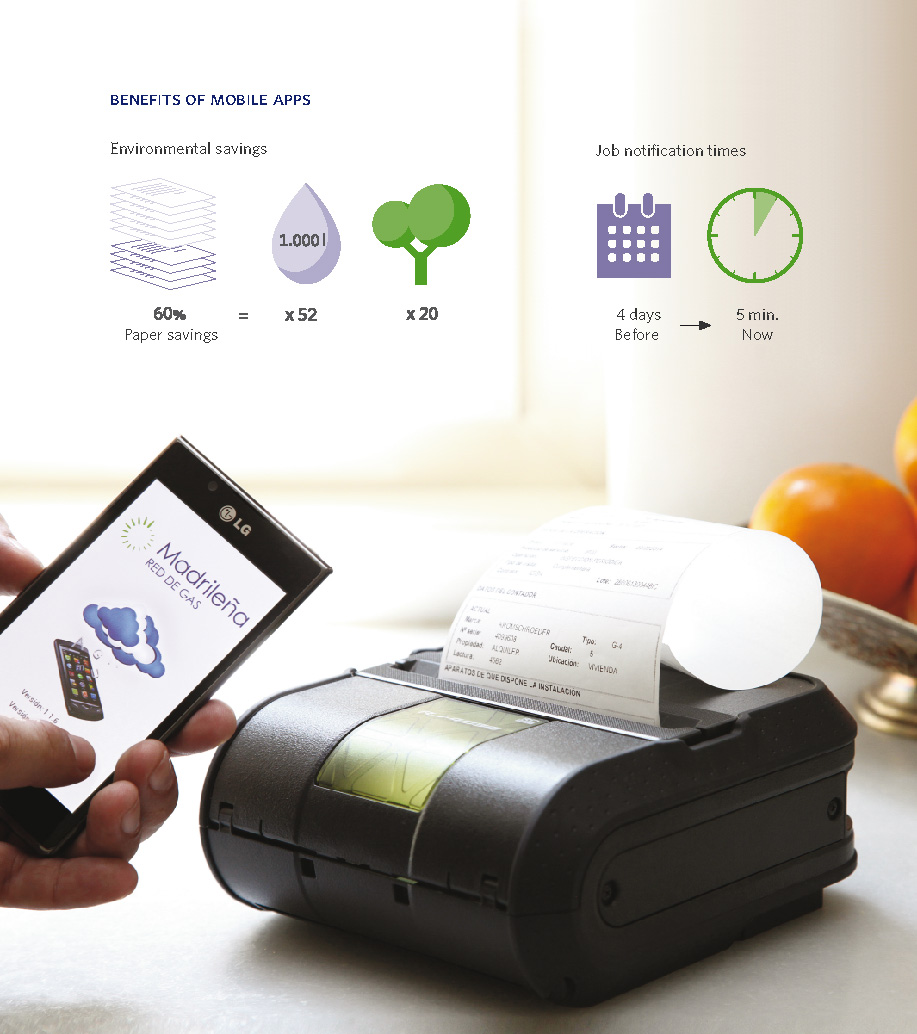
Since the introduction of the app in July 2013 it has supported over 300,000 transactions. This lightens the administrative burden surrounding the process and provides a rich complement of information captured in the field, including photographs, GPS coordinates and real-time delivery of work order records.
Today, all our contractors work with Android devices and portable printers, which means they do not need to visit the office to receive and download work orders.
Sustainable solutions for information systems
We have also made changes to our infrastructure management and storage contracts. MRG undertook market research to identify and establish suitable comparisons with a view to negotiating with the companies now providing these services. By renegotiating service contracts on the basis of this research, we achieved an annual cost saving of 35%. In addition, we increased our installed infrastructure base to cover our new SCADA software tool for distribution network monitoring.
With the new SCADA system, Madrileña Red de Gas has completed the implementation of software tools for its core activities. When it becomes operational, SCADA will provide real-time data supplied by all the metering and pressure regulating stations throughout our distribution network, so enabling monitoring and management 24 hours a day, 365 days a year, via a video wall in the new control center at our headquarters. The culmination of this project has in-sourced a service so far provided by Gas Natural Fenosa. By supporting end to end management of emergency responses and network monitoring by a single team of people, this change enhances consistent and coordinated action.
Efficient capex
MRG’s marketing model is based on executing efficient infrastructure for consumers applying for connections to the Madrileña network, and on an optimized, sustainable layout of the distribution network.
Madrileña Red de Gas builds a trunk network in the main artery of the municipality and lays down feeders to connection points at the same time as executing pipework. Our parallel work approach optimizes waiting times for supplying natural gas to new connection points.
MRG’s efforts have ensured that 50% of all pipework can be laid using far narrower trenches than the conventional width. We have used state of the art machinery, such as the machine known as La Zanjadora (“trench-digger”), which considerably reduces the inconvenience of digging trenches in municipalities by cleanly cutting through rock, frozen ground, pavements, etc., without damaging the surrounding terrain, obstructing traffic or creating noise or waste.
